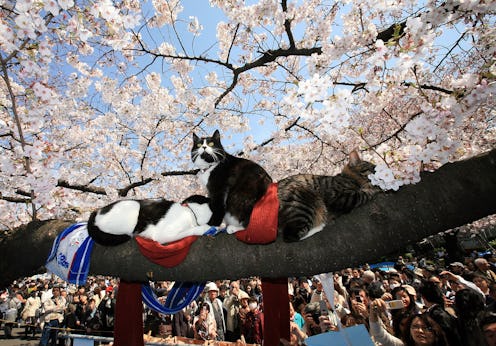Life
Here’s How To Make Sure Your Garden’s Safe For Cats

Gardening is an awesome pastime (and one with health benefits, too boot). But if you happen to have both an outdoor space in need of cultivating and a cat, you should a) bless your good fortune and b) do some planning about how to make your garden safe for cats. Your feline may love rolling around on the turf, but it can also get itself into some serious gardening trouble.
First things first: you need to know what kind of plants are toxic to cats, because there's a lot of them. Tulips and lilies are completely off the menu because a dose of them can be highly lethal to cats — but not all things labelled "lilies" actually belong to lilium proper. The plant known as lily of the Inca or Peruvian lily, alstromeria, is classified as non-toxic for cats, though they probably shouldn't make a habit of chewing on it. Some of the most popular garden plants are, alas, completely off-limits when it comes to cats, unless you own an indoor animal that is never allowed outside. Crocuses, azaleas, rhododendrons, oleander and cyclamen should all be off your gardening list.
Fortunately for us romantics, roses are completely fine for cats — though they will, like all animals, have an unpleasant time if they get snagged on the thorns, so don't plant them anywhere near your cat's usual hang-outs. But, as with lilies, some things that are called "roses" actually have other names: primroses and moss roses are not official rosa plants, and are toxic to cats. Stick to the traditional variety, and you'll be fine.
When it comes to turf and grasses, you've got far more options. Cats often eat grass, apparently to help their digestive system, and vets regard this behavior as completely normal. Healthy grasses for cats include lemongrass, purple fountain grass, and Japanese forest grass. They're even fine with grass-producing grains like wheat and barley.
Thinking that a tree-only garden might suit your cat? Yew trees are strictly off-limits; the berries are poisonous even to humans, and for cats they're deadly. Pretty English ivy is toxic too, as are apple trees, horse chestnuts and cherry trees. Fortunately, though, there are many options to make your garden pretty and cat-friendly; cactuses and palms are fine, as are pine trees (fortunately for Christmas lovers) and many other varieties of saplings and trees.
If you're absolutely set on flowers beyond roses, it's OK; your cat will be safe with many options. Petunias, zinnias, snapdragon, sunflowers and nasturtium are all perfectly safe for cats. And if you want to grow a herb garden, cats won't prevent you; common cooking herbs like parsley, coriander and basil are perfectly OK for your resident feline. It's also possible to create a corner of your herb garden purely for your cat's pleasure. Catmint, catnip, lavender, valerian, cat thyme, and mint are all beloved by cats, whether for their smell or their taste. You may have to cope with your cats rolling around happily on them, though; my own loves the catmint plant so much she frequently squashes it with her head.
If you love your cat and want it to have outdoor time, but are concerned about its hunting behavior or the territorial ideas of other cats, it's possible to rig your outdoor area to be a safe cat enclosure. You've got a lot of options for this, whether it's fencing that leans inwards (so they can't climb out) or netting, or even a caged area where they can experience sunshine and air without getting out to cause havoc. There are many different ways to do this, so talk to your vet about what will work best for your cat's behavior and your spatial needs.